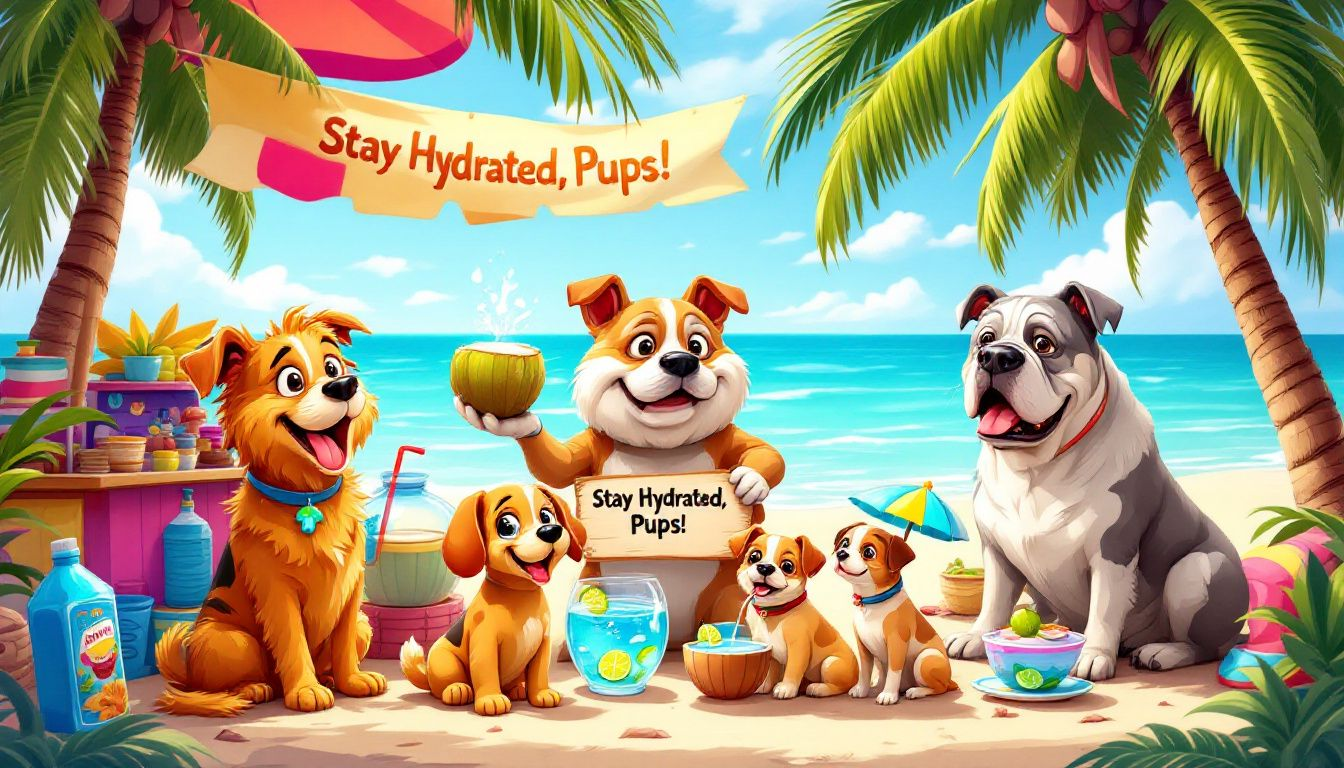Can Dogs Drink Coconut Water? The Health Benefits and Risks

Can Dogs Drink Coconut Water? The Health Benefits and Risks
Can dogs drink coconut water? Yes, in moderation. It’s hydrating, but there are risks. This article covers benefits and precautions.
Key Takeaways
- Coconut water can be a hydrating treat for dogs but should only be given in moderation, never replacing their regular water.
- While it offers benefits like potassium and magnesium, coconut water also poses risks such as hyperkalemia and digestive upset if given in excess.
- Always consult your veterinarian before adding coconut water to your dog’s diet to ensure it’s safe and suitable for their health needs.
-
For a safe and flavorful hydration go-to, LYX Hydralicious Mix combines coconut water with savory chicken or beef broth. Crafted with simple, natural ingredients, it’s a science-backed solution designed to keep dogs of all ages hydrated, healthy, and happy.
Is Coconut Water Safe for Dogs?

Coconut water is generally safe for dogs in moderation. It can be a fun treat to offer, especially on hot days or after a vigorous play session. However, coconut water should never replace your dog’s regular water intake. Fresh water is sufficient for keeping your dog hydrated on a daily basis.
While coconut water has its benefits, it’s not without risks. One potential issue is hyperkalemia, a condition characterized by elevated potassium levels that can lead to heart dysfunction and gastrointestinal problems in dogs.
Additionally, some brands of coconut water contain harmful ingredients like xylitol, which is toxic to dogs. Allergic reactions are also a possibility, manifesting as hives or gastrointestinal distress.
Given these considerations, consulting a veterinarian is crucial. Dogs have unique dietary needs, and professional advice can help tailor their diet to meet specific health requirements, especially as they age or if they have existing health issues.
Your vet can confirm if any new dietary addition is safe and beneficial for your furry friend.
Health Benefits of Coconut Water for Dogs

Coconut water can be an excellent source of hydration for dogs, particularly during hot weather or after exercise. It’s rich in potassium, which supports muscle function and helps maintain fluid balance in the body. This makes it a great occasional treat to help keep your dog hydrated and feeling their best.
In addition to potassium, coconut water contains magnesium, which is essential for muscle and nerve function. It also provides small amounts of vitamins such as vitamin C and B-complex, contributing to overall immune health. The amino acid arginine found in coconut water can support both heart health and immune function.
However, it’s crucial to remember that coconut water should not replace regular water, which remains the primary source of hydration for dogs.
LYX contains coconut water that should be used as a daily supplement to your dog’s diet, offering it in moderation to reap its benefits without overloading on any single nutrient.
How Much Coconut Water Can Dogs Drink?
Start with a small amount of LYX when introducing coconut water to your dog’s diet. A tablespoon mixed into your dog’s food or water bowl is a good starting point. This allows you to monitor how your dog reacts to the new addition without overwhelming their system.
For larger dogs, you can gradually increase the amount, but always maintain moderation to avoid potential health issues. Always keep an eye out for any adverse reactions, such as digestive upset or changes in behavior to aid digestion.
Moderation is key. Even though coconut water has its benefits, giving too much can lead to problems like hyperkalemia or digestive issues. By starting small and gradually increasing the amount, you can safely incorporate coconut water into your dog’s diet.
Potential Risks of Coconut Water in a Dog's Diet

While beneficial, coconut water also carries potential risks. The sugar content in coconut water, although lower than some beverages, can contribute to weight gain and complicate conditions such as diabetes. Additionally, some dogs may experience digestive upset from coconut water.
Coconut water may also act as a diuretic in dogs, potentially leading to dehydration due to increased urine production.
High levels of potassium in coconut water can be harmful if consumed in large quantities, leading to conditions like hyperkalemia.
Treat LYX as a daily indulgence, in their regular diet. This approach helps mitigate the risks of too much coconut water while still allowing your dog to drink coconut water and enjoy the benefits of this refreshing beverage.
How to Incorporate Coconut Water into Your Dog's Food

Adding dog coconut water to your dog’s diet can be a fun and healthy change. Begin with a small amount, like a tablespoon mixed into their water bowl. This can add a tropical twist to their regular routine without overwhelming their system.
You can also sprinkle coconut water on your dog’s food occasionally for variety. Freezing coconut water into ice cubes can provide a cool treat for your dog on a hot summer day.
These frozen treats can be particularly enjoyable and help keep your dog hydrated during warm weather.
Homemade frozen treats made from dog-safe ingredients are another enjoyable way to include coconut water in your dog’s diet.
Creativity allows you to provide your dog with a fun, refreshing treat that incorporates the benefits of coconut water.
Alternatives to Coconut Water for Keeping Your Dog Hydrated

If you’re looking for alternatives to coconut water to keep your dog hydrated, there are several options available.
One such option is LYX Hydralicious Mix, a premium pet hydration brand focused on helping dogs stay hydrated, healthy, and happy.
The flagship product, LYX Hydralicious Mix, is a blend of coconut water and savory chicken or beef broth.
LYX products are crafted using natural, simple ingredients with proven benefits. This blend provides essential hydration for dogs of all ages and is a flavorful, science-backed way to refresh your dog.
LYX Hydralicious Mix offers a refreshing treat that can help keep your dog hydrated, even on the hottest days.
By incorporating LYX Hydralicious Mix into your dog’s diet, you can ensure they stay properly hydrated while enjoying a delicious and nutritious beverage.
This alternative to coconut water can be a great way to prioritize your dog’s wellness and keep them healthy and happy.
Signs Your Dog Might Be Dehydrated
Recognizing dehydration signs in your dog is crucial for their health and well-being. Here are some key indicators to look for:
- A lack of skin elasticity; if your dog’s skin does not quickly return to its place when pulled, this may suggest dehydration.
- A dry nose.
-
Dry, sticky gums.
By being aware of these signs, you can take action to ensure your dog’s health.
Other signs include a delayed capillary refill time, observed by pressing on the gums; in healthy dogs, the color returns almost instantly. Additionally, dehydration can cause lethargy, reduced appetite, vomiting, and sunken eyes.
Recognizing these signs helps ensure your dog remains properly hydrated and healthy. Awareness of these indicators allows you to take prompt action against dehydration, maintaining your furry friend’s optimal health.
Consult Your Veterinarian Before Making Dietary Changes
Consult your veterinarian before introducing coconut water or any new food to your dog’s diet. This ensures that the addition is safe based on your dog’s medical history and individual health needs. A vet’s guidance can help prevent adverse health effects from improper nutrition.
A veterinarian can determine the appropriate amount of coconut water for your dog, as individual needs vary.
Gradual changes to a dog’s diet prevent digestive disturbances and ensure a smooth transition. Regular veterinary visits help monitor your dog’s health in relation to dietary changes. Dogs drink coconut water.
Pet nutritional counseling helps dog owners understand their dog’s unique dietary requirements, avoiding negative health outcomes from improper feeding.
By consulting your vet, you can ensure your dog’s diet is both healthy and balanced. This is an essential aspect of any dog owner’s guide.
Summary
In summary, coconut water can be a safe and beneficial treat for dogs when given in moderation. It offers various health benefits, including hydration and essential nutrients, but it’s important to be aware of potential risks such as digestive upset and hyperkalemia. Always start with small amounts and monitor your dog’s reaction.
Consulting your veterinarian before making any dietary changes is crucial to ensure the safety and well-being of your furry friend. By following these guidelines, you can provide your dog with a refreshing and healthy treat that enhances their overall diet.
Frequently Asked Questions
Can dogs drink coconut water every day?
Nope, it's best to give your dog coconut water as an occasional treat rather than making it a daily thing. Too much can upset their stomach!
How much coconut water is safe for dogs?
It's safe to start with a tablespoon of coconut water for your dog and gradually increase it, but always keep it in moderation. Too much can upset their tummy!
Are there any risks associated with coconut water for dogs?
Definitely, there are risks like digestive upset, hyperkalemia, and allergic reactions. So, it's best to give coconut water to your dog in moderation and watch for any bad reactions!
What are some alternatives to coconut water for keeping my dog hydrated?
Try LYX Hydralicious Mix, which combines coconut water with tasty broths to keep your pup hydrated! It's a great alternative that'll make them happy and refreshed.
What signs should I look for to know if my dog is dehydrated?
If your dog has dry gums, a dry nose, or is more lethargic than usual, it might be dehydrated. Keep an eye out for these signs to ensure your furry friend stays healthy!
